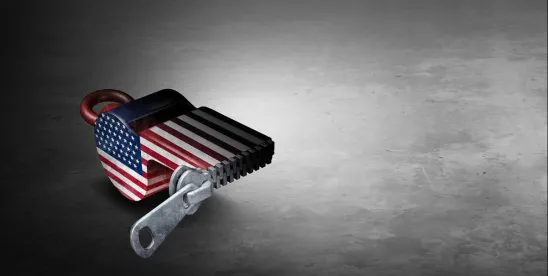The Department of Justice (“DOJ”) released its Corporate Whistleblower Awards Pilot Program on August 1, 2024. This initiative, which is expected to last three years, aims to enhance corporate crime detection, expand enforcement and prosecution efforts, and encourage reporting by incentivizing whistleblowers with the potential of significant payouts. Going forward, companies should pay close attention to DOJ’s statements and guidance and assess their existing compliance program to ensure that they are encouraging internal reporting and have procedures in place to quickly investigate, remediate, and potentially disclose misconduct.
For years, the Securities and Exchange Commission, Commodity Futures Trading Commission, and the Financial Crimes Enforcement Network have maintained whistleblower programs. When announcing the DOJ’s Pilot Program last March, Deputy Attorney General Lisa Monaco said these programs, while successful, do not address “the full range of corporate and financial misconduct” that DOJ prosecutes. Monaco emphasized that DOJ’s new program aims to fill the gaps in the existing patchwork. The Pilot Program goes into effect immediately.
Impacting the Pilot Program is DOJ’s recent amendment to its Corporate Enforcement and Voluntary Self-Disclosure (“VSD”) Policy. Under the amendment, a company that receives an internal report of misconduct from a whistleblower and reports that misconduct to DOJ within 120 days is eligible for a presumption in favor of declining prosecution. To be eligible for the presumption, the company must also cooperate fully and commit to remediation of the wrongdoing. Along with the whistleblower awards program, this amendment provides DOJ with more tools to encourage companies to strengthen internal reporting systems and to incentivize voluntary self-disclosure of corporate crimes and misconduct.
Foreign and domestic companies should reassess anti-corruption, trade compliance, and other compliance programs and should consider revising existing programs as needed to encourage internal reporting of concerns regarding potential non-compliance with company policies and applicable laws.
Covered Violations
To qualify for an award, the information provided by a whistleblower must be related to one of the following types of criminal conduct:
- Violations by financial institutions, their insiders, or agents, including schemes involving money laundering, anti-money laundering compliance violations, registering of money transmitting businesses, fraud statutes, and fraud against or non-compliance with financial institution regulators.
- Foreign corruption and bribery violations under the Foreign Corrupt Practices Act, the Foreign Extortion Prevention Act, or money laundering statutes.
- Violations related to the payment of bribes or kickbacks to domestic (U.S.) public officials.
- Federal health care offenses not covered by the False Claims Act, including federal health care offenses and related crimes involving private or other nonpublic health care benefit programs and health care fraud schemes involving private insurance plans.
Eligibility and Rewards
- Whistleblowers may be eligible for an award under the Pilot Program if, alone or jointly with other individuals, the whistleblower provides DOJ with original information, in writing, which leads to criminal or civil forfeiture exceeding $1 million in connection with a successful prosecution, criminal resolution, or civil forfeiture action. The whistleblower must cooperate fully with DOJ’s investigation.
- Whistleblowers must provide truthful, original, non-public information about corporate misconduct to qualify for potential compensation under the program.
- Whistleblowers may report suspected misconduct internally before reporting to DOJ but are not required to do so in order to be eligible under the pilot program. If the whistleblower reports the alleged misconduct internally through company reporting channels, they must subsequently report it to DOJ within 120 days. A whistleblower may therefore choose to go directly to DOJ without first reporting through internal channels.
- Information will not be considered original if it was obtained through communications subject to attorney-client privilege, or if the whistleblower’s principal duties include compliance or audit responsibilities. Whistleblowers who work for third-party firms conducting or supporting internal investigations will also not be eligible for any rewards.
- Whistleblowers that would be eligible for an award through another U.S. whistleblower, False Claims Act qui tam, or similar program will not be eligible for an award under the Pilot Program if they report the same misconduct. However, DOJ encourages whistleblowers to submit information to multiple programs to allow DOJ and other agencies to decide which program is best suited to address the alleged misconduct.
Whistleblowers are eligible for an award even if they initially report information through their employer’s internal reporting procedures. However, the whistleblower must also report the same information to DOJ within 120 days of making an internal report. Whistleblowers may receive up to 30 percent of the first $100 million in net proceeds forfeited, and up to 5 percent of net proceeds between $100 million and $500 million. There is no award on net proceeds forfeited above $500 million. The maximum potential award is set at $35 million. The payment of any award is subject to DOJ’s discretion. DOJ will take into consideration, among other things, the significance of the information provided and the whistleblower’s cooperation and level of assistance. A whistleblower’s level of culpability, unreasonable delay in reporting, and interference with internal compliance and reporting systems may decrease award amounts. A whistleblower is not eligible for payment if they meaningfully participated in the misconduct or criminal activity. DOJ may, however, determine that a whistleblower is eligible if he or she played a minimal role and any misconduct was “sufficiently limited” in scope.
VSD Policy Amendment
The VSD Policy amendment provides that, where a whistleblower makes both an internal report and a report to DOJ, a company may qualify for a presumption of declination under the VSD Policy even if the whistleblower reports the misconduct to DOJ before the company does. The company, however, must report the conduct to DOJ within 120 days of receiving the internal report and before DOJ contacts the company about the misconduct. Thus, the “declination window” may be shorter than 120 days, as DOJ could reach out before then. The amended VSD Policy and the Pilot Program effectively require companies to swiftly investigate and disclose misconduct to avoid steep penalties and prosecution.
What Companies Can Do Now
The Pilot Program will be administered by the Criminal Division’s Money Laundering and Asset Recovery Section (“MLARS”). MLARS has taken a leading role in prosecuting foreign corruption and other international crimes in recent years but will likely expand its role into domestic corruption and national security issues as a result of its mandate here. MLARS will certainly place increased focus on the seizure and forfeiture of money.
Companies can take proactive steps to mitigate risk by re-evaluating their voluntary self-disclosure decision making and to improve existing compliance policies and procedures.
A few steps companies can take include:
- Clear Policies and Procedures:
- Establish clear guidelines and encourage employees to report misconduct.
- Communicate these policies to all employees through training sessions, handbooks, and regular reminders.
- Anonymous Reporting Channels:
- Provide confidential or anonymous reporting channels (such as hotlines or online platforms).
- Non-Retaliation Assurance:
- Assure employees that they will not face retaliation for reporting.
- Implement strong anti-retaliation policies and enforce them consistently.
- Leadership Support:
- Leadership should actively promote a culture of integrity and transparency.
- Incentives and Recognition:
- Consider offering incentives for early reporting or successful outcomes.
- Recognize and appreciate employees who report misconduct.
- Training and Awareness:
- Regularly train employees on recognizing red flags and reporting procedures.
- Foster awareness about the importance of reporting for the company’s well-being.
- Testing of Internal Controls:
- Ensure that existing compliance policies and procedures are working and are accurately identifying risks and detecting potential misconduct.
- Voluntary Disclosure:
- Review and strengthen internal investigation policies and procedures.
- Conduct thorough, timely investigations into alleged misconduct.
- Companies have 120 days or less to review internal complaints and reports of misconduct and to disclose to DOJ to qualify for declination under the amended VSD Policy.





 />i
/>i
